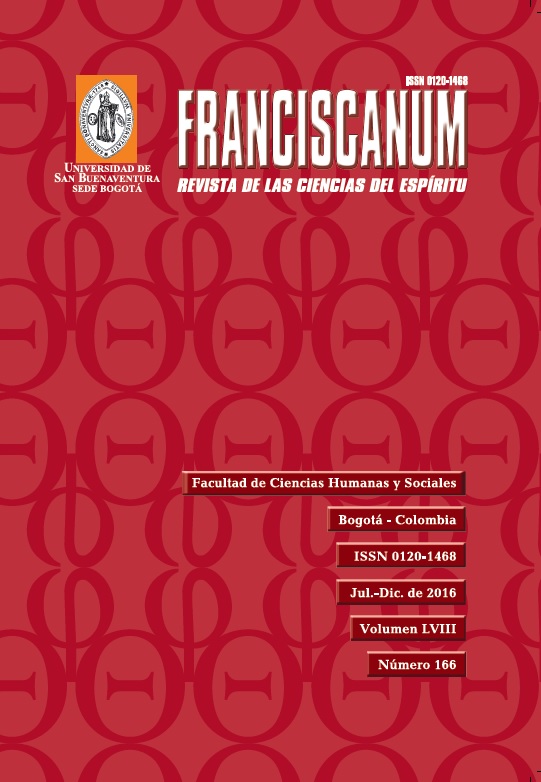This journal provides immediate open access to its content, based on the principle that giving the public free access to research helps a greater global exchange of knowledge.
Therefore, the Creative Commons 4.0 Attribution Attribution - Equal Share (by-sa) License is accepted: The commercial use of the work and the possible derived works is permitted, the distribution of which must be done with a license equal to that regulates the original work.
http://creativecommons.org/licenses/by-sa/4.0/
Along these same lines and in line with the Open Access policy, it is clarified that the authors maintain their rights to articles, without restrictions and, in the same way, they maintain their publication rights, without restrictions. They are only asked to reference the number of the Franciscanum magazine where the article initially appeared.
Abstract
References
________. «Habermas’ account of the role of religion in the public sphere: A response to Cristina Lafont’s critiques through an illustrative political debate about same-sex marriage». Philosophy Social Criticism 7, Vol. 39 (2013): 637-673.
Al-Hayani, Fatima Agha. «Biomedical Ethics: Muslim Perspectives on Stem Cell Research and Cloning». Zygon 4 Vol. 43 (2008): 783-795.
Arendt, Hannah. The Human Condition. Chicago: The University of Chicago Press, 1998.
Baumeister, Andrea. «The Use of “Public Reason” by Religious and Secular Citizens: Limitations of Habermas’ Conception of the Role of Religion in the Public Realm». Constellations 2, Vol. 18 (2011): 222-243.
Bernstein, Richard. «Naturalism, Secularism, and Religion:
Habermas’s Via media». Constellations 1, Vol. 17 (2010):
155-166.
Boettcher, James. «Habermas, Religion and the Ethics of Citizenship». Philosophy and Social Criticism 1-2, Vol. 35 (2009): 215-238.
Breitowitz, Yitzchok. «What’s So Bad About Human Cloning?». Kennedy Institute of Ethics Journal 4, Vol. 12 (2002): 325-341.
Cerella, Antonio. «Religion and the Political Form: Carl Schmitt´s Genealogy of Politics as Critique of Jurgen Habermas´ Post-Secular Discourse». Review of International Studies 5, Vol. 38 (2012): 975-994.
Chambers, Simone. «How Religion Speaks to the Agnostic: Habermas on the Persistent Value of Religion». Constellations 2, Vol. 14 (2007): 210-223.
Christiansen, Karin. «The silencing of Kierkegaard in Habermas’ critique of genetic enhancement Medicine». Health Care and Philosophy 2, Vol. 12 (2009): 147-156.
Cooke, Maeve. «A Secular State for a Postsecular Society? Postmetaphysical Political Theory and the Place of Religion».
Constellations 2, Vol. 14 (2007): 224-238.
________. «Salvaging and secularizing the semantic contents of religion: the limitations of Habermas’s postmetaphysical
proposal». International Journal of Philosophy of Religion
1, Vol. 60 (2006):187-207.
Garzón, Iván. «Deliberación democrática y razones religiosas: objeciones y desafíos». Co-herencia 16, Vol. 9 (2012): 81-117.
________. La religión en la razón pública. Bogotá: Astrea/
Universidad de la Sabana, 2014.
Ghaly, Mohammed. «Human Cloning Through the Eyes of Muslim Scholars: The New Phenomenon of the Islamic International Religioscientific Institutions». Zygon 1, Vol. 45 (2010): 7-35.
Habermas, Jurgen. ¡Ay Europa! Pequeños escritos políticos. Madrid: Trotta, 2009.
________. Carta al Papa. Consideraciones sobre la fe. Barcelona: Paidós, 2009.
________. Conciencia moral y acción comunicativa. Barcelona: Península, 1985.
________. «El concepto de la dignidad humana y la utopía realista de los derechos humanos». Diánoia 64, Vol. lv, (2010): 3-25.
________. El discurso filosófico de la modernidad. Madrid: Taurus, 1989.
________. El futuro de la naturaleza humana ¿Hacia una eugénesis liberal? Madrid: Paidós, 2002.
________. Entre naturalismo y religión. Madrid: Paidós, 2006.
________. Facticidad y validez. Madrid: Trotta. 1998.
________. Israel o Atenas. Ensayos sobre religión, teología y
racionalidad. Madrid: Trotta, 2001.
________. «La voz pública de la religión. Respuesta a las tesis de Paolo Flores d´Arcais». Claves de razón práctica 180 (2008): 4-6.
________. Mundo de la vida, política y religión. Madrid: Trotta, 2015.
________. Perfiles filosófico-políticos. Madrid: Taurus, 1975.
________. Pensamiento postmetafísico. México: Taurus, 1990.
Habermas, J.; Taylor, Ch.; Butler, J. y West, C. El poder de la religión en la esfera pública. Madrid: Trotta, 2011.
Habermas, Jurgen y Ratzinger, Joseph. Entre razón y religión.
Dialéctica de la secularización. México: fce, 2008.
Hoyos, Guillermo y Rueda, Eduardo, eds. Filosofía política: entre la religión y la democracia. Bogotá: Pontificia Universidad Javeriana, 2011.
Huxley, Aldous. Brave New World and Brave New World Revisited. London: Harper Collins, 2004.
Mendieta, Eduardo. «El debate sobre el futuro de la especie humana: Habermas critica la eugenesia liberal». Isegoría Vol. 27 (2002): 91-114.
________. «Religion in Habermas’s Work». En Calhoun, C.; Mendieta, E. y VanAntwerpen, J., eds. Habermas and Religion.
Cambridge: Polity Press, 2013.
Motahari Farimani, Mohammad. «Islamic Philosophy and the
Challenge of Cloning». Zygon 1, Vol. 42 (2007): 145-152.
Popovsky, Mark. «Jewish Perspectives on the Use of Preimplantation Genetic Diagnosis». Journal of Law, Medicine & Ethics 4, Vol. 35 (2007): 699-711.
Singer, Peter. «De compras por el supermercado genético». Isegoría Vol. 27 (2002): 19-40.
Zahraa, M. y Shafie, S. «An Islamic perspective on IVF and PGD, with particular reference to Zain Hashmi, and other similar cases». Arab Law Quarterly 2, Vol. 20 (2006): 152-180.




















